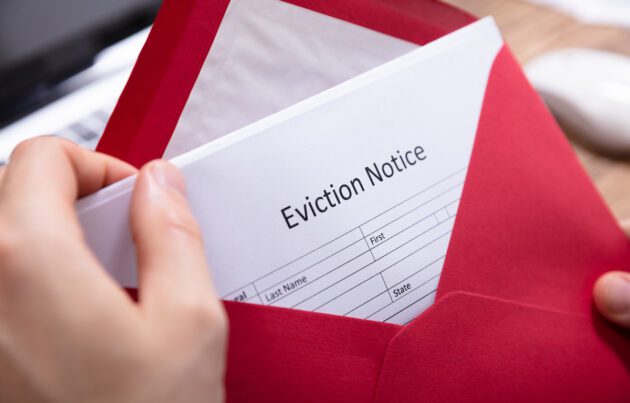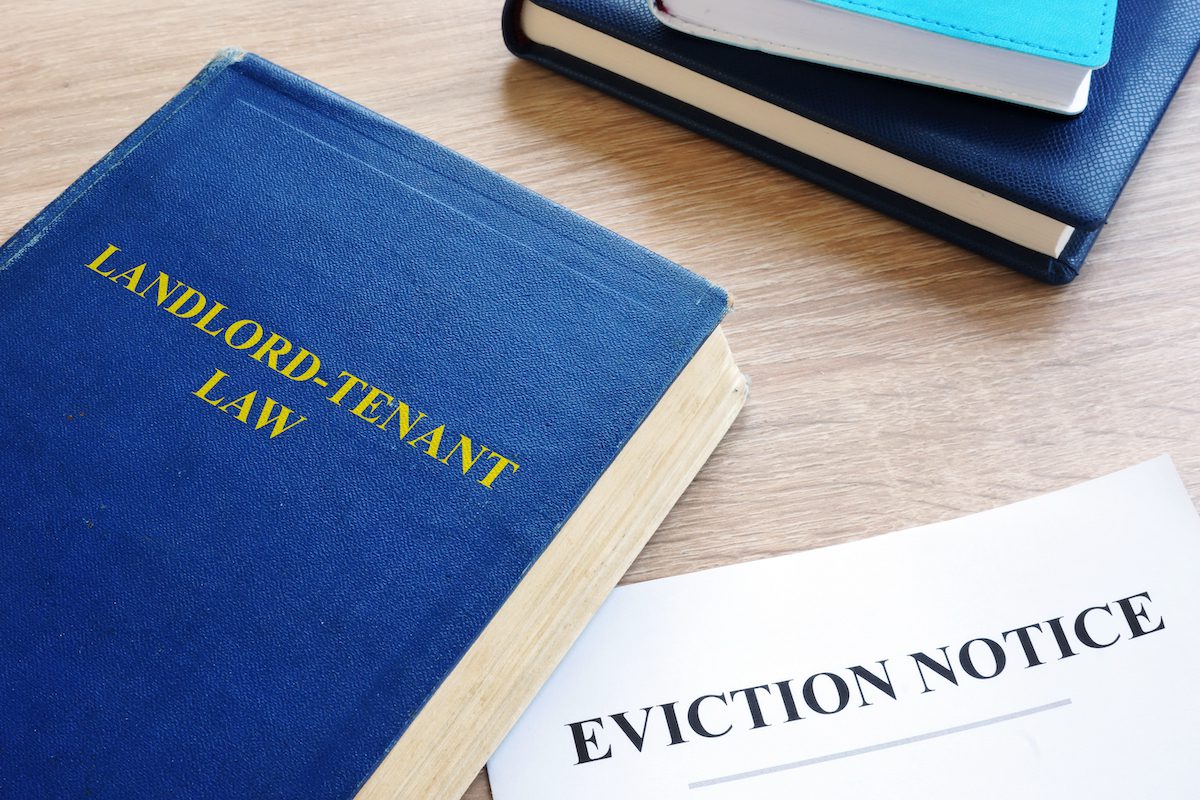What is an Eviction? Everything Landlords Need to Know

Eviction lawsuits are something you never want to experience. In a perfect world, your tenants always pay the rent, always follow the terms in rental agreements and make being a landlord a pleasure. You'd never have to ask yourself, "What is an eviction?"
If something does go wrong, it's up to you to decide what action you should take and whether it's time to seek assistance and file an eviction lawsuit.
Although it all starts with a written notice, starting an eviction case doesn't necessarily mean your tenant has to go. It can sometimes serve as a warning that leads to your tenant taking the necessary action to fix the issue. Put differently, not all eviction notices result in actually getting evicted.
Why would I serve a notice to vacate?
A notice to vacate, or an eviction notice, usually comes about because the tenant isn't doing something they're legally obligated to do. This could involve an issue with paying rent on time, late fees owed on previous payments, illegal activity on the property or failure to pay the rent altogether.
The most common reason a landlord usually decides to begin eviction proceedings is because of unpaid rent. The other primary reason is breaking the rules of the rental agreement. This can be anything from bringing in a pet without permission to receiving too many noise complaints. When you prepare your lease or rental agreement, make sure you specify what issues are “evictable" offenses, as well as how many opportunities you're willing to give before eviction notices get issued.
Reasons you cannot evict a tenant
Although there are plenty of reasons for a landlord to submit termination notices to bad tenants, the Federal Fair Housing Act sets specific reasons you cannot use as grounds for eviction. These are known as protected classes and include:
- Race
- Color
- Sex
- National origin
- Religion
- Familial status
- Disability
Your state may have additional protected classes, as well, which you should familiarize yourself with prior to renting your property.
Additionally, if a tenant withholds rent because of a safety or health issue that has yet to get addressed, you can't evict them for not paying rent. It's within their right to do this to ensure that, as the landlord, you're providing them with a safe and habitable place to live.
Other reasons that won't really hold up in court when it comes to eviction proceedings include using it as:
- A retaliatory measure for something a tenant does that you don't like or agree with
- A way to avoid getting into another fight with your tenant
- A way to avoid getting sued for negligence
Should your tenant make a complaint, and you still have a real reason to evict them, it's OK to go ahead and do so, but watch your timing. If the notice comes too close behind a compliant, like around three to six months after, a judge may view the action as purely retaliatory.
State laws around the eviction process
Each state has its own set of eviction laws, so it's important you know the ones that pertain to you.
Some states favor landlords, while others are more tenant-friendly. For example, California eviction laws favor tenants instead of landlords, while Texas eviction laws are more landlord-friendly. Some states also have their own city-specific laws that override state laws, so make sure to check and see if this situation applies to you.
Regardless of your property's location, specific laws are in place to spell out how to give proper notice and how the legal eviction process begins. They'll also stipulate time frames for the notice period, including when an eviction notice expires.

Is there such a thing as eviction protection?
Coming out of the COVID-19 pandemic, some tenants may not be clear on whether or not they have eviction protection. During the pandemic, the Supreme Court did issue a moratorium on eviction cases. This helped protect tenants during the unpredictable times the entire country found itself in. The moratorium ended in August 2021.
Individual states, counties and cities can still ban evictions or may have other tenant protections in place. It's best to research this issue before taking any step toward giving the notice to vacate.
How do you serve an eviction notice?
Regardless of why you've decided to initiate an eviction suit, you need to prove a lease violation with appropriate documentation. Once you've got that, it's time to write the formal letter that starts the whole process.
Start with a letter
There are a few different types of eviction letters, but you'll most likely start with one notifying your tenant of their offense in a way that gives them an opportunity to fix it. The letter should also let them know that, if the issue isn't handled within your set amount of days, you'll file an actual eviction lawsuit.
If you get past this stage without any success, you may want to issue unconditional quit notices. These are an immediate order to move out.
Tips for writing an eviction letter
When tenants see the word eviction, they panic. Even if you try to sugarcoat it by using words like "vacate notice," "quit notice" or "termination notice," you're still immediately putting them on the defensive.
To make things easier, here are some tips for writing termination notices in a way that doesn't lead to too much panic.
- Keep the tone throughout the letter clear, concise and professional
- Clearly state what the letter is about — this is an eviction notice
- Give a specific reason(s) why you've begun this process
- Provide details/evidence linked to the reason for eviction, and be specific. If it's for an inability to pay the rent, list the months in question. If it's for other lease violations, share dates/times, etc.
You want to deliver the notice directly onto the property, either by attaching it to the front door or handing it directly to your tenant.

How can a tenant fight the legal eviction process?
In most cases, the legal process of eviction gives your tenant an opportunity to fix the issue. If they're able to pay the necessary rent amount they owe you or deal with the specific violation from your lease agreement stated in the eviction notice, the situation might be over. This is the ideal scenario, known as a cure or quit. It prevents you from having to file an eviction lawsuit and deal with court costs.
There are, however, a few select instances where you can evict a tenant without giving them the chance to fix the violation. These scenarios are considered no-cure since nothing a tenant can go will remedy the situation.
Most often, no-cure situations involve safety, both of your rental property and the surrounding community. These include selling or distributing drugs, domestic violence and criminal activity. In these cases, you'll want the eviction process to go quickly.
What happens in an eviction case that goes to court?
Once you've done all you can to notify your tenants of their pending eviction, and given them an opportunity to resolve the issue, the next step is getting legal assistance. Hiring legal counsel will help you successfully navigate the whole process, which usually takes about 20 to 30 days.
The first step is to file an unlawful detainer lawsuit with the local court. From there, you'll receive a court date. This information will go to you and your tenants. Both parties should attend. After hearing a sworn statement from each side, along with reviewing applicable court papers and evidence, the judge rules on the issue.
More often than not, the ruling is in the landlord's favor.
If the landlord wins
There are two ways you'll win your suit in court. The first is to receive a default judgment. This happens when your tenant fails to show up on the specified date. The other way to win is to present enough evidence to have the judge rule in your favor.
Either way, after the judge rules in your favor, local law enforcement gets involved and can end up escorting your tenants from the property if they don't vacate on their own. You'll also have the ability to now change the locks and take back possession of your rental property.
Additional rulings from the judge may also enable you to get back any money owed for unpaid rent along with attorney fees and other associated fees.
If the tenant wins
While not as likely to occur since evictions often favor the landlord, if a tenant wins the case, they'll most likely get permission to stay in the home for the remainder of the lease agreement. In this instance, it can also happen that the landlord will owe at least part of the legal fees the tenants incurred.
If the issue resolves itself before the court date
In some cases, the tenants will move out before the eviction lawsuit goes to court, but after you've filed the paperwork. If that happens, you must still show up on your court date to finalize terms. The judge will still hand down a ruling since the hearing is already in progress.
Failing to show up can lead to you owing money associated with the court costs automatically, whereas, by being there, that responsibility could fall on the tenant.

Can I lease my rental to someone with a previous eviction?
An eviction can stay on a tenant's public record for up to seven years. After this time period has passed, it no longer shows up on their rental history and credit report. That means there's only so long you'd know you were renting to someone with a previous eviction on their record.
An evicted tenant is aware that future attempts at renting are going to prove more difficult, but it doesn't have to be an automatic "no" from you. As an independent landlord, the choice is yours on who you're comfortable with when it comes to signing a rental agreement, so it might be worthwhile to do a little extra investigating.
Should a prospective tenant come to you with an eviction on their record, ask them for more information. Get the whole story about the circumstances around their specific situation. It might not present as high of a risk as you thought.
You should also ask them to provide references that demonstrate they're financially able to pay rent and afford your property.
When all else fails, you can always request a co-signer come in to serve as backup on the rental agreement. This added level of security can help eliminate concern about this particular tenant paying rent.
All the knowledge you never hope to use
Understanding the eviction process keeps you prepared just in case. While it's something you never hope to have to do, even a thorough screening doesn't always absolve you from a renter making a mistake. Whether that's lost rent, breaking the lease or something worse, you have all the power to protect your property.
